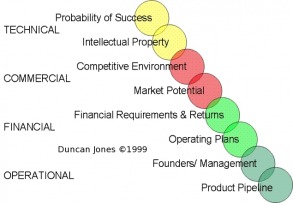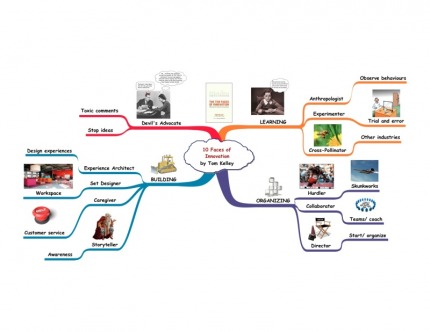|
Yesterday, I heard Dr. H. Douglas Barber of McMaster speak at a Communitech event. Much of what he said was based on the research paper he co-authored in Mar 2005, "Growing R&D-Intensive Firms in Canada" which is available on theImpact Group's website along with many other interesting papers.
The implications to the Canadian business and the economy are serious. The findings include:
"You cannot be a success in any business without believing that it is the greatest business in the world."
"If you want to achieve excellence, you can get there today. As of this second, quit doing less-than-excellent work." "Follow the path of the unsafe, independent thinker. Expose your ideas to the danger of controversy. Speak your mind and fear less the label of 'crackpot' than the stigma of conformity." "Wisdom is the power to put our time and knowledge to the proper use." Outlined below is my reply to the following interesting article comparing entrepreneurs and project managers and how they view/ handle risk.
As the Entrepreneur Magazine quote states: Entrepreneurs assume risk. That does not imply they take more risks, are not risk averse, or do not thoroughly plan for risk. Indeed the successful entrepreneurs that I know are inherently risk adverse and as a result plan as thoroughly as possible in the uncertain and ever changing world of launching a new business. Where they do differ from project managers is that in addition to planning for, tracking and managing the risk, they "assume" or take full responsibility for the risks, their plans, activities and outcomes when reporting to their investors, including all mistakes, oversights and failures. This responsibility is that extra spark (or craziness) that we associate with entrepreneurs. Attached is the rubric I developed and use to mark the business plans of my students taking the George Brown College Research/ Commercialize/ Innovate (RCI) course. A good rubric is not just a collection of scales from 1-5 or poor to excellent as these measures are difficult to assess and can vary significantly from assessor to assessor. Better rubrics list a series of individual items that should be included/ achieved for each level making it less subjective for grading as well as providing clear instruction and feedback to the contributor. As a result, good rubrics can be difficult to construct.
 I was recently reminded of this excellent outline for a business plan. I initially discovered it almost 20 years ago - this version is 1997. The 16 pages give an outline of all the major and minor sections one should consider - but of course one should be selective and only emphasize those that are most important for the current opportunity. See EYplan.pdf. Above is a model of the major sections of a business plan ad how they interact that I first developed for a talk at the Toronto Biotechnology Initiative in November 1999 to explain what Venture Capitalists wanted to hear about. For these last 10+ years, you will never see a business presentation from me where this figure does not creep in I just rediscovered this in the book entitled "Bringing Your Product to Market" (1997) , although there looks like author Don Debelak has a revised edition. In the introduction, he lists the 5 essential criteria for a successful product:
The Economist just held a interesting online debate on whether the (US) government should be involved in innovation. See http://www.economist.com/debate/days/view/483weeblylink_new_window
The "No government" side believes that there is in "a robust, bottom-up version of innovation that harnesses the creativity and enterprise of the many, including the "venturesome consumers".The "Pro-government" side believes government is important in spurring and shaping innovation. Both sides believe government has a role supporting education, basic research and regulations. The final reader vote resulted in a split decision. |
InnovationThoughts and items on innovation and entrepreneurship. Archives
March 2012
Categories |
||||||

 RSS Feed
RSS Feed